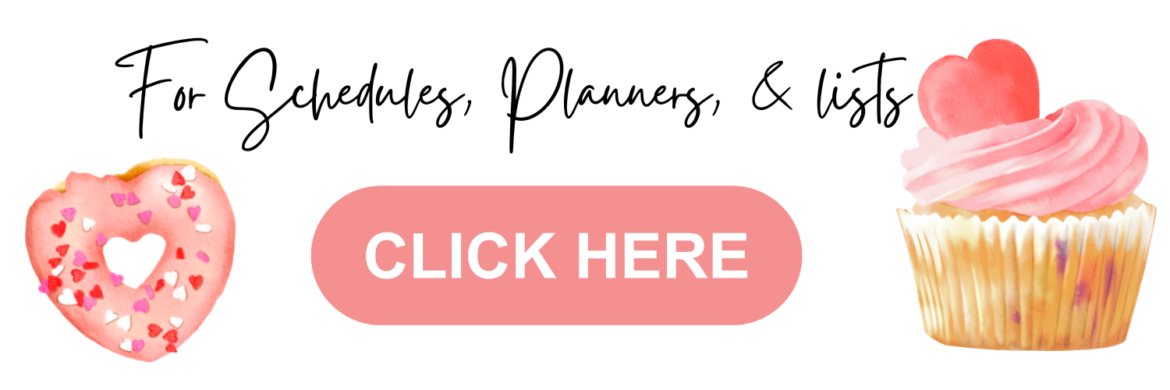Lifestyle
How To Take back control of your wellness with the Teen Self-care Planner.
As a teen, you’re busy; studying, socializing, taking part in extracurricular activities, and just trying to balance life. Despite your packed schedule, it’s important to take time for yourself and practice healthy self-care habits. Self-care isn’t about splurging on the latest items or expensive facials, it’s about taking care of your physical, mental, and emotional well-being through small daily rituals that empower you with confidence and optimism. As high schoolers juggle a variety of commitments, from exams to dating — some parents are understandably worried about how their children will find the time for self-care. For those looking for practical tips on how to help their child navigate their teens, we’ve created this comprehensive Teen Self-Care Planner, which is the perfect resource for supporting resilience in teenagers!
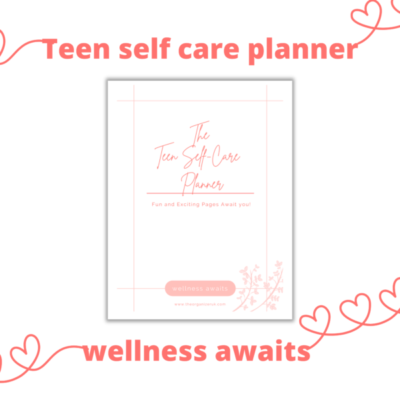
How to use the teen wellness planner
- Set time aside each day for yourself.
Find an hour in the day that you can use to unwind and relax. It’s important to take time for yourself each day, no matter how busy you may be. Finding just one hour in your day to unwind and relax can make all the difference for your mental health and overall well-being. Maybe it’s waking up an hour earlier to have a drink in peace or reading a chapter of your book. Whatever you chose, prioritize yourself and make it a habit.
- Use the self-care planner pages.
Taking care of ourselves is always important, especially during these challenging times. That’s why having a teen self-care planner can be a helpful tool for keeping track of your wellness routines. Keeping a planner can remind us that self-care is not selfish but rather necessary for our mental, emotional, and physical health. With a self-care planner, we can prioritize activities such as exercise, meditation, and connecting with loved ones. A planner also allows for flexibility and adjustment as our needs and schedules change. Remember, taking care of oneself is an act of kindness and self-love. So, make self-care a priority and use the planner to help guide yourself along the way.
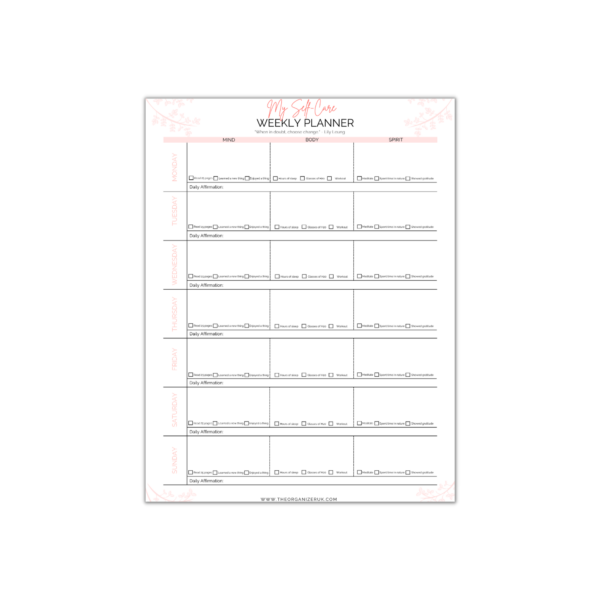
- Keep a gratitude journal.
Writing down things that you are thankful for can help you have a better outlook on life. This is called keeping a gratitude journal. Writing down the good things in your life each day can help you focus on the positive instead of the negative things. Even if it’s something small, being grateful for it can make you happier and better able to handle tough times. Keeping a gratitude journal will remind you of all the good stuff and help keep your attitude positive. If you stay consistent with writing it down, being thankful will become part of your life!
- Use the Gratitude list.
This gratitude list is a simple yet powerful tool that can help you cultivate a more positive outlook on life. Essentially, a gratitude list is a daily or weekly list of things that you are thankful for. It can include anything from big things like your health or friends you love to small things like a delicious cup of hot chocolate or a cozy blanket.
The act of writing down what you are grateful for can help shift your focus away from negative thoughts and towards the good things in your life. So why not try incorporating the gratitude list into your routine? Not only will it help you feel more thankful and appreciative, but it might also lead to a happier and more contented life overall.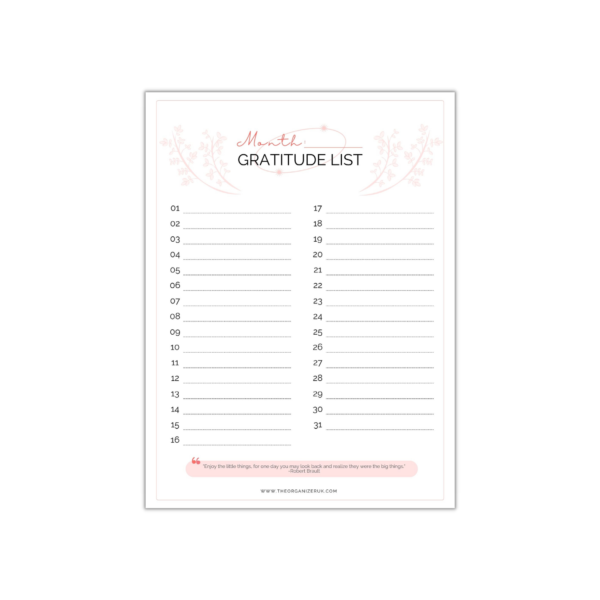
- Try using empowering affirmations.
In a world that can often feel overwhelming and discouraging, it’s essential to practice positive self-talk and affirmations to empower ourselves. Affirmations are powerful tools that we can use to retrain our thought patterns, shift our energy, and cultivate more confidence, optimism, and resilience. Whether you’re seeking to improve your self-esteem, overcome limiting beliefs, or simply elevate your mood, incorporating a daily affirmations practice can significantly impact your life. With a little bit of guidance and discipline, you can create your own empowering affirmations list and start seeing the positive changes unfold before your eyes.
- Organize the stress pages.
Managing stress can be challenging, but with the stress planner, it becomes more manageable. It is essential to organize your stress planner by jotting down everything causing you to stress. This will help you identify the areas that require more attention and focus. A helpful tip for organizing your mood planner is to categorize your stressors into personal, school or college related, and others. This way, you can prioritize your tasks and tackle them one by one. Remember to be kind to yourself during this process and take breaks when needed. By doing this, you’ll find you are able to overcome stress effectively.
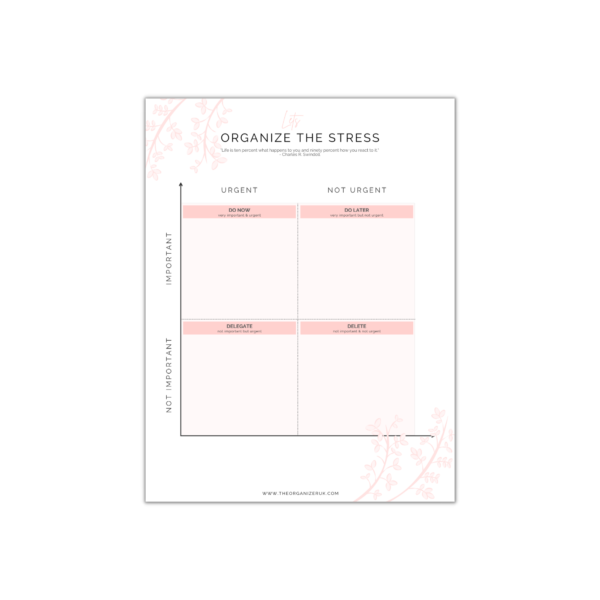
- Go outside every day to get fresh air and sunshine, which has many benefits for mental health.
It’s no secret that getting fresh air and sunshine can do wonders for our mental health. Even just a quick stroll outside can lift our mood and help us feel more energized. It provides a break from being cooped up inside; being out in nature has been shown to reduce stress and anxiety levels. Plus, if you’re able to get some exercise in while you’re outside, it can only add to the benefits. So the next time you’re feeling overwhelmed or down, take a step outside and see if the great outdoors can work its magic on you.
- Eat balanced meals
Ensure you get the right nutrients to stay energized and healthy. Eating balanced meals is extremely important for maintaining good health and energy levels. But with so many food options, it can be hard to know what to eat to get all the necessary nutrients. That’s why it’s crucial to be mindful of the foods we consume and ensure that we are getting the right balance of carbohydrates, fats, and proteins. By consciously eating balanced meals, we can fuel our bodies with the nutrients they need to function optimally and maintain good health. You can track your progress using the monthly habit tracker, where there is space to track your water intake and exercise daily.
- Work out regularly
Working out regularly is a great way to keep your body strong and your mind healthy. Exercising can make you feel better. It helps your body release endorphins, which make you happier. Exercise also makes you less likely to get certain illnesses like heart disease and cancer. Plus, exercise can help you think and remember things better. With so many benefits, it’s easy to see why working out regularly should be a part of everyone’s routine. Whether it’s a brisk walk with the dog, a quick bike ride, or lifting weights, find an activity that you enjoy, and record it on your habit tracker.
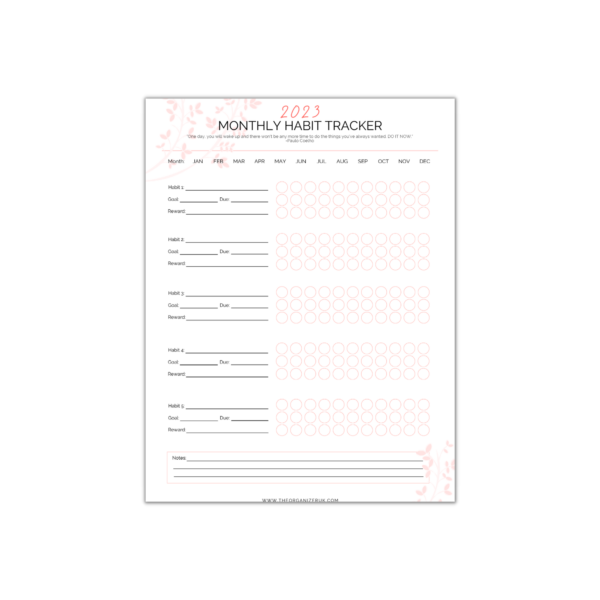
- Use your monthly habit tracker.
We all have little habits that we’d like to incorporate into our routines but struggle to commit to. That’s where a monthly habit tracker can come in handy. Using a tracker lets you visualize your progress and hold yourself accountable. Whether it’s drinking more water, exercising regularly, or meditating daily, a habit tracker can help you form positive habits that will stick over time. Remember, it takes time and effort to make a habit truly stick, but with a little help from a tracker, you’ll be on your way to a healthier, happier you.
- Period tracker
Sometimes it can be hard to keep track of your menstrual cycle. A period tracker can help. It remembers the dates and length of your cycle. It also tells you how you’re feeling and what symptoms you have. This helps you make better decisions about your health. Use the period tracker if you want to know more about your menstrual cycle!
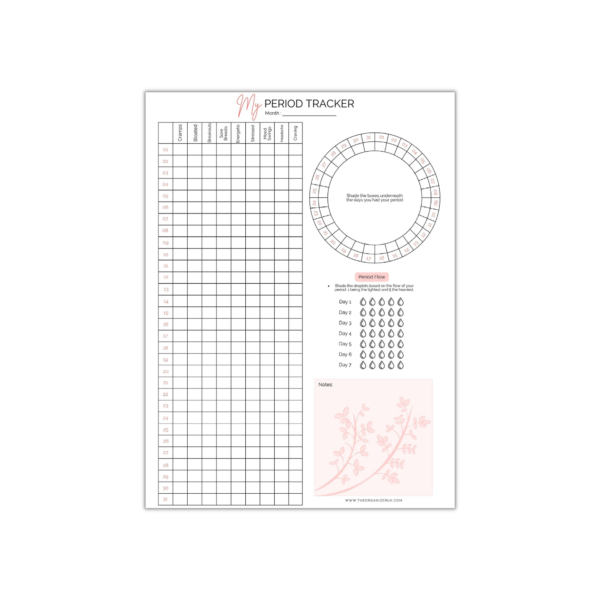
- Take breaks throughout the day, and give yourself time away from screens or studying in order to reset.
Take breaks when studying. Breaks help you stay productive and not get too tired. One way to do this is the Pomodoro technique
: work for 25 minutes, then take a 5-minute break. During your break, go for a short walk or stretch and do something that isn’t work-related. Take a longer break, like lunch, to rest before getting back to work.
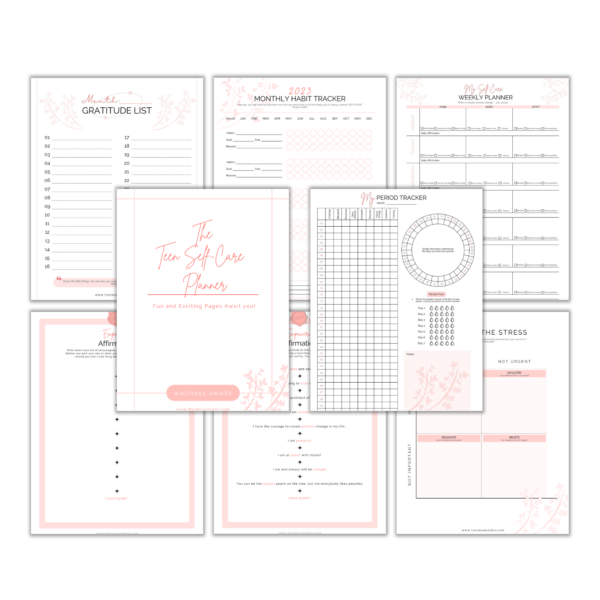
Taking time for yourself and making sure to feed your body and mind is essential for success with studies and mental health. Setting time aside each day, working out regularly, eating balanced meals, keeping a gratitude journal, taking breaks throughout the day, and going outside every day – these are all things you can do to help yourself when it comes to studies and mental health. All of these elements in combination, can help us balance our lives and put us in a better frame of mind. So take some time for yourself today – you deserve it! Do you have other tips or tricks to help you stay positive while studying? Share them with us in the comments below!
